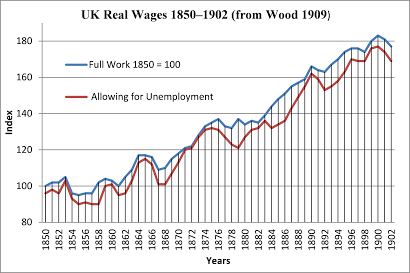In Friedrich Engels’s Herr Eugen Dühring’s Revolution in Science (1894; first published in 1878), he argued that industrial capitalism, partly by means of automation and use of machines, drove workers’ wages down to a subsistence level and tended to keep them there: “Thus it comes about that the excessive labour of some becomes the necessary condition for the lack of employment of others, and that large-scale industry, which hunts all over the world for new consumers, restricts the consumption of the masses at home to a famine minimum and thereby undermines its own internal market.” (Engels [1894]: 308). This is quite a claim. Capitalism reduces workers’ wages and consumption to a “famine minimum.”Our actual data on real wages from the late 19th century shows us this was false even then. It’s another Marxist theological dogma.To show why this is so, let us turn to some good empirical data. Wood (1909: 102–103, Appendix) gives data on UK real wages from 1850 to 1902, constructed from the wage data for working people in a whole range of industries, which can be seen in the graph below.
Topics:
Lord Keynes considers the following as important: Engels, subsistence wages
This could be interesting, too:
Stavros Mavroudeas writes Once Again on the Alleged Differences between Marx and Engels – S.Mavroudeas 2023 WAPE Forum
Stavros Mavroudeas writes On the anniversary of F.Engels death
Stavros Mavroudeas writes Επέτειος θανάτου του Friedrich Engels
Stavros Mavroudeas writes Το video της διαδικτυακής ημερίδας για τα 200 χρόνια από την γέννηση του Engels, 28-11-2020
This is quite a claim. Capitalism reduces workers’ wages and consumption to a “famine minimum.”“Thus it comes about that the excessive labour of some becomes the necessary condition for the lack of employment of others, and that large-scale industry, which hunts all over the world for new consumers, restricts the consumption of the masses at home to a famine minimum and thereby undermines its own internal market.” (Engels [1894]: 308).
Our actual data on real wages from the late 19th century shows us this was false even then. It’s another Marxist theological dogma.
To show why this is so, let us turn to some good empirical data. Wood (1909: 102–103, Appendix) gives data on UK real wages from 1850 to 1902, constructed from the wage data for working people in a whole range of industries, which can be seen in the graph below.
As we can see, this rise in living standards was especially apparent in the deflation of 1873 to 1896, when nominal wages were generally sticky and prices fell, so that living standards soared, but was also perfectly well apparent in the inflationary periods before and after this bout of deflation.
Perhaps Engels generalised from his limited experience and observations in the 1840s or 1850s, but in any case he was still wrong.
BIBLIOGRAPHY
Engels, Friedrich. [1894]. Herr Eugen Dühring’s Revolution in Science (trans. Emile Burns from 1894 edn.). International Publishers, New York.
Wood, George H. 1909. “Real Wages and the Standard of Comfort since 1850,” Journal of the Royal Statistical Society 72: 91–103.

